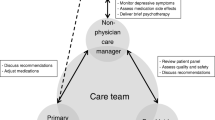Abstract
Evidence-based psychotherapies to treat depression are available, yet it remains unknown the extent to which these practices are used in routine care for depression. Using survey and administrative data, we sought to describe usual care psychotherapy for depression for adult patients receiving care through a large, managed behavioral health care organization. Data from 420 patients receiving psychotherapy for depression and 159 of their therapists provide evidence that some practitioners are using evidence-based psychotherapy techniques for depression, but also demonstrate the need for improved tools to monitor and improve quality of psychotherapy in usual care.
Similar content being viewed by others
References
Addis, M. E., & Jacobson, N. S. (2000). A closer look at the treatment rationale and homework compliance in cognitive-behavioral therapy for depression. Cognitive Therapy and Research, 24, 313–326.
Azocar, F., Cuffel, B., McCulloch, J., McCabe, J. F., Tani, S., & Brodey, B. B. (2007). Monitoring patient improvement and treatment outcomes in managed behavioral health. Journal for Healthcare Quality, 29, 4–12.
Busseri, M. A., & Tyler, J. D. (2003). Interchangeability of the working alliance inventory and working alliance inventory, short form. Psychological Assessment, 15, 193–197.
Chambless, D. L., Baker, M. J., Baucom, D. H., Beutler, L. E., Calhoun, K. S., Crits-Christoph, P., et al. (1998). Update on empirically validated therapies, II. The Clinical Psychologist, 51, 3–16.
Hepner, K. A., Azocar, F., Greenwood, G., Miranda, J., & Burnam, A. (this issue). Development of a clinician report measure to assess psychotherapy for depression in usual care settings. Administration and Policy in Mental Health and Mental Health Services Research. doi:10.1007/s10488-009-0249-4.
Hoge, M. A., Paris, M., Adger, H., Collins, F. L., Finn, C. V., Fricks, L., et al. (2005). Workforce competencies in behavioral health: An overview. Administration and Policy in Mental Health, 32, 593–631.
Horvath, A. O., & Greenberg, L. S. (1989). Development and validation of the working alliance inventory. Journal of Counseling Psychology, 36, 223–233.
Horvath, A. O., & Luborsky, L. (1993). The role of therapeutic alliance in psychotherapy. Journal of Consulting and Clinical Psychology, 61, 561–573.
Institute of Medicine. (2001). Crossing the quality chasm: A new health system for the 21st century. Washington: IOM, National Academy Press.
Jacobson, N. S., Dobson, K. S., Truax, P. A., Addis, M. E., Koerner, K., Gollan, J. K., et al. (1996). A component analysis of cognitive-behavioral treatment for depression. Journal of Consulting and Clinical Psychology, 64, 295–304.
Kaiser Family Foundation and Health Research and Educational Trust. (2003). Employer health benefits: 2003 summary of findings. Washington, DC: Kaiser Family Foundation. Retrieved September 5, 2007, from http://www.kff.org/insurance/upload/kaiser-family-foundation-summary-of-findings.pdf.
Kazantzis, N., Deane, F. P., & Ronan, K. R. (2000). Homework assignments in cognitive and behavioral therapy: A meta-analysis. Clinical Psychology: Science and Practice, 7, 189–202.
Lambert, M. J., Harmon, C., Slade, K., Whipple, J. L., & Hawkins, E. J. (2005). Providing feedback to psychotherapists on their patients’ progress: Clinical results and practice suggestions. Journal of Clinical Psychology, 61, 165–174.
Miller, S. D., Duncan, B. L., Sorrell, R., & Brown, G. S. (2005). The partners for change outcome management system. Journal of Clinical Psychology, 61, 199–208.
Murray, C. J., & Lopez, A. D. (1996). The global burden of disease: A comprehensive assessment of mortality and disability from disease, injuries, and risk factors, in 1990 and projected to 2020. Boston: Harvard School of Public Health, on behalf of the WHO and the World Bank.
Miranda, J., Hepner, K. A., Azocar, F., Greenwood, G., Ngo, V., & Burnam, A. (this issue). Development of a patient-report of psychotherapy for depression. Administration and Policy in Mental Health and Mental Health Services Research.
Olfson, M., Marcus, S. C., Druss, B., Elinson, L., Tanielian, T., & Pincus, H. A. (2002). National trends in the outpatient treatment of depression. JAMA, 287, 203–209.
Sholomskas, D. E., Syracuse-Siewert, G., Rounsaville, B. J., Ball, S. A., Nuro, K. F., & Carroll, K. M. (2005). We don’t train in vain: A dissemination trial of three strategies of training clinicians in cognitive-behavioral therapy. Journal of Consulting and Clinical Psychology, 73, 106–115.
Wells, K. B. (1999). Treatment research at the crossroads: The scientific interface of clinical trials and effectiveness research. American Journal of Psychiatry, 156, 5–10.
Acknowledgements
We thank the MacArthur Network on Mental Health Policy Research for financial support and intellectual guidance. We would also like to thank the in-kind contribution of staff time, supplies, and the access to members and their providers by OptumHealth Behavioral Solution.
Author information
Authors and Affiliations
Corresponding author
Rights and permissions
About this article
Cite this article
Hepner, K.A., Greenwood, G.L., Azocar, F. et al. Usual Care Psychotherapy for Depression in a Large Managed Behavioral Health Organization. Adm Policy Ment Health 37, 270–278 (2010). https://doi.org/10.1007/s10488-009-0247-6
Published:
Issue Date:
DOI: https://doi.org/10.1007/s10488-009-0247-6




